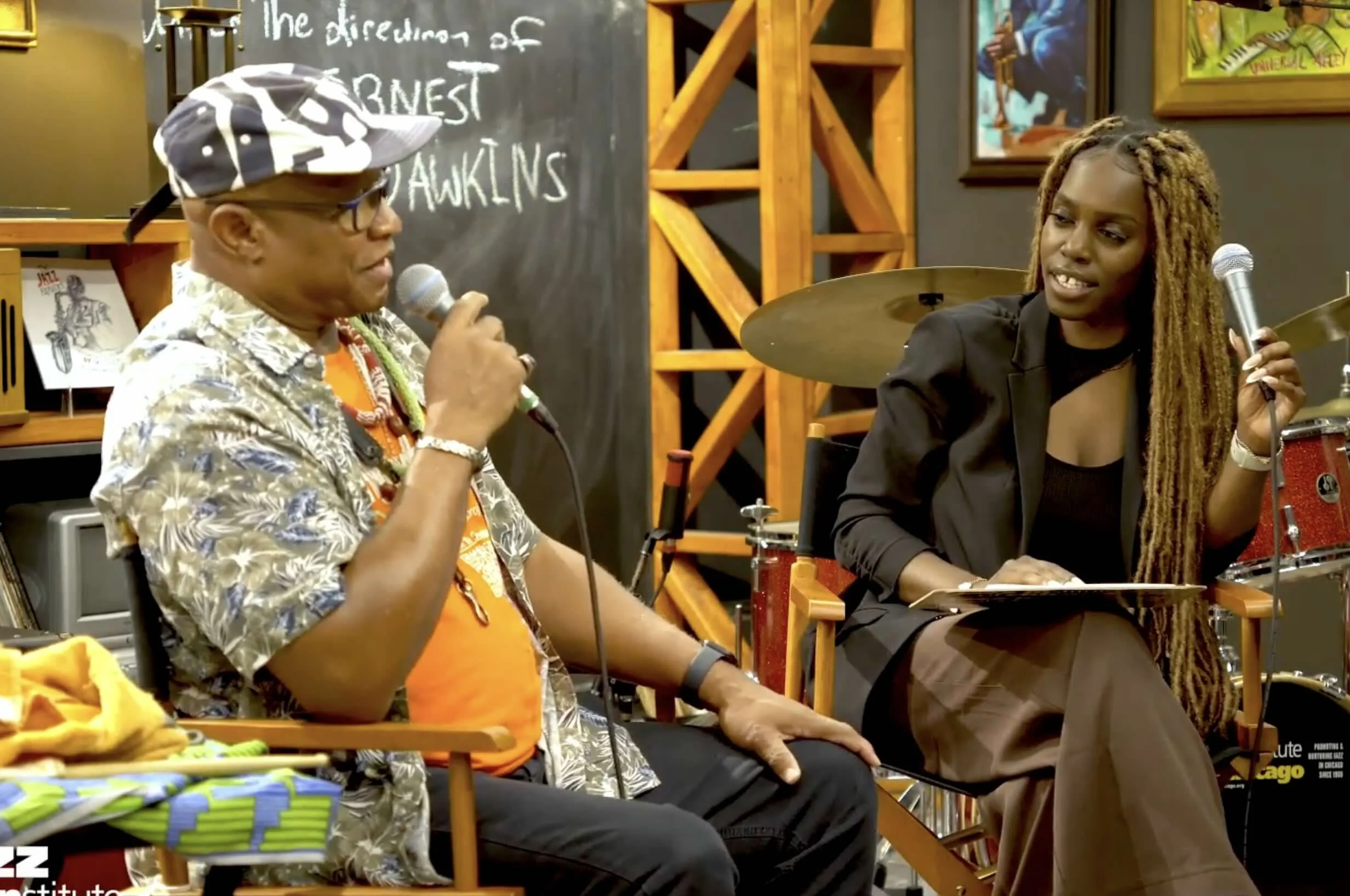JIC’s Zakiya Fola talks Englewood jazz Fest with Ernest Dawkins
This conversation was recorded on September 18, 2024 at the Jazz Institute of Chicago as part of our Front Row program series. The conversation preceded a Front Row concert featuring Live The Spirit Residency Presents The Young Masters.
Zakiya Fola:
Thank you everyone for being here this evening to witness the great Mr. Dawkins. But I would like to introduce him as Ernest Kabeer Dawkins, but I will always call him Mr. Dawkins. Just to give you a little backstory about how I met Mr. Dawkins, I was introduced to him because my family, they're musicians, and I used to play jazz trombone myself. And through the years I have seen Mr. Dawkins, and he has mentored so many young students through his Live the Spirit Residency program. And he has been such a great impact to young students growing up because in my generation, I grew up with the great Marquis Hill, Ryan Nyther, Michael Davenport, saxophonist. And just to see our growth from when we first met Mr. Dawkins to now, it's just great to see and be a part of. And then also Mr. Dawkins, I just want you to know, it's great to work with you, share stories, and laugh with you, and also learn from you, so I'm really excited about this conversation.
Ernest Dawkins:
Thank you very much, Zakiya.
Zakiya Fola:
So 25 years, Englewood Jazz Festival. What inspired you to start hosting a neighborhood festival and how was your vision for the event evolve over the past 25 years?
Ernest Dawkins:
Ooh, that's three questions in one. Thank you. Well, to answer the first part of that question, when I received a grant from New Residencies out of New York, it was New Residencies number seven. And you could kind of situate the grant any way you wanted to. You can construct it. And as long as it was appeasing and it was doing something in relationship to jazz and composition, they pretty much approved you. So I said, "Well, what do I want to do?" My friend, my best friend, Ameen Muhammad had received it the year before, and he did a series of concerts. And I said, "I don't want to do just a series of concerts. I want to do something institutional that's going to have a lasting effect on the community."
So I thought about that. I said, "Well, what community am I going to?" Because I started, I said, "Well, I could go to Roseland, I could go to Austin." And then I thought about it, "Oh, dummy, go to Englewood. You know Englewood. You grew up around Englewood." I knew Hamilton Park because I was lived in Englewood. We moved to Washington Park, and my cousins lived in Englewood. So I was spending the night with my cousins on the weekends, and we would go up to Hamilton Park. I said, "Well, there you go. There's your answer." So that's why I went to Hamilton Park initially to get the residency. And then we raised additional monies to bring people in to rehearse with the band. We paid them to rehearse, the big band, and we paid them to write compositions and relationship to the music. So from the beginning, it was always original composition and mentoring young musicians to further the music, and do it in the community, and the community that I had relations with. So that's why Englewood.
And my vision over the years, so now we're in our 25th year. So what we want to do is to branch out. We want to start a free program for our children so we can have jazz programs for our children when they learn for free, and get a head start on the music, because what we find out is that in the Black community in particular, in particular on the South Side, all the music is gone out of the schools so we need to have them learn the music at early age. So we need to have an institute in relationship to the music. And I talked to various other people, I talked to the blues kids, I talked to the ... What's the gospel choir over there? There's the children's choir. So we talking about doing something possibly together, but that's where we want to branch off into and have it. We want to do all our programming is free Live the Spirit Residency, everything is free. So we want to continue that in the next 25 years, then we can next bring the next 25 generations up in the music.
Zakiya Fola:
So that's nice to hear. So what you were saying with the neighborhood and the community, how have they responded over the years, with 25 years of jazz in Englewood?
Ernest Dawkins:
Well, I always said that it would take us 20 years to get known, pretty much so. But you have to know that, you have to have the long-term vision, because I've been through short-term visions, and they don't work out too well. So with our community, the community has to know that you're there. They have to know that you're consistent. They have to know that you're sincere about what you're doing. And then, now, they ask me, "When is the festival? I haven't seen the flyers. You don't have the flyers out. " They're calling me and complaining. So that's good and that's a good thing.
So now the community is buying into what we do, and that's part of that process. So it takes that amount of time, it takes that amount of work to get things institutionalized because I look at just being a member of the Association for the Advancement of Creative Musicians, that was instilled in us. I didn't become a member to become a great musician. I became a member because it was the institution. So when I started this institution, I wanted to be an institution living long beyond just me.
Zakiya Fola:
Greatness. So just to get more to the weekend for the musicians that be performing, who should we expect to?
Ernest Dawkins:
Well, everybody that's been associated. Well, I said for the 25th, the board, we said that we're going to focus on the people that have been around and been associated with the programs. So Jahari Stampley will be there Thursday, Junius Paul will be there Thursday, Friday, we're having Jeremiah Collier. He'll be there along with Nicole Mitchell on Friday. On Saturday, we're having a panel of Black presenters. So that'll be Saturday, during the first time on a Saturday. Then, we had the Young Masters again on Saturday. We have Cory Wilkes, we have Greg Ward, and then we're going to do an encore presentation of Paul Robeson, man of the people, and then all the other people that's been associated the festival will come up, and we're going to do some kind of ... I don't know what we are going to do. We're going to play, that's all. We are going to bring the saints in or something, you know what I'm saying? And my only reason Marquis and Maurice are not going to be there because they're on tour. That's it.
Zakiya Fola:
Whomp, whomp. But it's going to be a great festival of music and live music. And just to top it off, what would you like for everyone to take away from the festival or leave with tonight to bring them out to the weekend?
Ernest Dawkins:
You know from our board, we want to give thanks to the Jazz Institute for having this preview because we've been getting some press, so we're doing pretty good. But we just want to thank everybody for their support. We want to thank everybody for sometimes their patience, because you have to be patient in this music, because ... And we want to just encourage people to come out and support the music everywhere it is. And we need more festivals in the community. We don't need less. So it's not a competition thing in terms of that. I did this to spur other people to do other things, and I think it's working. So that's the whole point. So there's room for other people. There's room for other situations, and we just want to make sure that what we do in Chicago gets the utmost support, and gets those kind of chances and facilities and everything that they deserve in terms of support, particularly for supporting the music, because it's not easy.
It's not easy coming up in music, particularly if you are a high school person, and you just picked up an instrument, and you're a junior in high school, and you are up against people that's been playing since they were fourth grade. It's a whole another bag. And you have to be a special individual to overcome that, and survive that, and work hard, and get through it to get to where you want to be. So we just want to continue support, and we want to talk to some people that are doing this grant now for retiring musicians. We want to start a jazz foundation in Chicago for musicians. When you get to my age, you have something to look forward to. No, I'm just joking. No, but we're looking at doing a foundation if we can, so they ask me if I want to be interested? Oh yeah, that's one thing we want to do because everything we with Live the Spirit Residency is musician-supported. That's like the ACM is musician-supported, and the musician-initiated. We get support from our contractors, and that's where we're coming from, so that's it.
Zakiya Fola:
Well, that concludes our conversation. But I just want to also leave that with the organizations, and like you said, we come together and support that the students have more opportunities to play jazz. And through the years, they've had Jazz Institute with the Jazz Links program, and also Live the Spirit over the years for 25 years. So this is great, that we continue to build more education programs, and just things like this, front row support programming and donations to nonprofit organizations is always great as well. And it was great talking to you, Mr. Dawkins. I look forward to the weekend-
Ernest Dawkins:
Thank you.
Zakiya Fola:
... because I'm also emceeing, guys.
Ernest Dawkins:
She's the emcee for the 25th Annual Englewood Jazz Festival.
Zakiya Fola:
For the 25th, and I also want to say, put things in existence, talk it out. Because a year ago, what did I ask you, Mr. Dawkins?
Ernest Dawkins:
She asked me to be the emcee.
Zakiya Fola:
Yes. And I only wanted one day. And now, I have three.
Ernest Dawkins:
There you go.
Zakiya Fola:
Ooh, I'm so excited. So yes-
Ernest Dawkins:
There you go.
Zakiya Fola:
... come out this weekend. But before this weekend, we have the Lift the Spirit Young Masters who are going to come up here and share their genius with you guys or with us.

